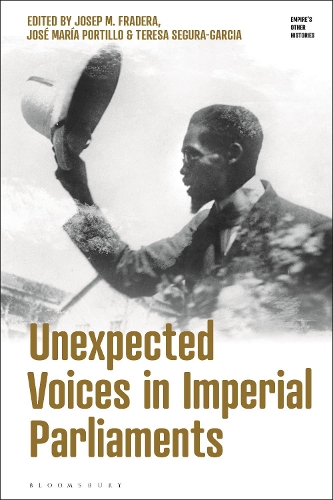
Unexpected Voices in Imperial Parliaments
(Hardback)
Publishing Details
Unexpected Voices in Imperial Parliaments
By (Author) Josep M. Fradera
Edited by Jos Mara Portillo
Edited by Teresa Segura-Garcia
Bloomsbury Publishing PLC
Bloomsbury Academic
26th August 2021
1st July 2021
United Kingdom
Classifications
Tertiary Education
Non Fiction
Social and cultural history
General and world history
328.09224
Physical Properties
Hardback
304
Width 156mm, Height 234mm
599g
Description
This collection follows the extraordinary careers of nine colonial subjects who won seats in high-level parliamentary institutions of the imperial powers that ruled over them. Revealing an unexplored dimension of the complex political organisation of modern empires, the essays show how early imperial constitutions allowed for the emergence of these unexpected members of parliament, asks how their presence was possible, and unveils the reactions across metropolitan circles, local communities and the voters who brought them to office. Unearthing the entanglements between political life in metropolitan and non-European societies, it illuminates the ambiguous zones, the margins for negotiation, and the emerging forms of leadership in colonial societies. From a Hispanicised Inca nobleman, to recently emancipated slaves and African colonial subjects, in linking these individuals and their political careers together, Unexpected Voices in Imperial Parliaments argues that the political organisation of modern empires incorporated the voices of the colonised and the non-European, in an ambiguous relationship that led to a widening of political participation and action throughout the imperial world. In doing so, this book offers a comprehensive but nuanced reassessment of the making and unmaking of modern empires.
Reviews
In Unexpected Voices in Imperial Parliaments, editors Josep M. Fradera, Jos Mara Portillo and Teresa Segura-Garcia bring together contributors to examine the careers of nine colonial subjects who became legislators in imperial parliamentary institutions from the time of the French Revolution to the Second World War. In exploring the norm-shattering voices of these figures as well as the challenges they faced, this book offers an urgent reflection on the promises and limitations of liberalism in our contemporary moment. * LSE Review of Books *
The book is both innovative and suggestive. The book's theme is of great historical interest and importance, and this book will certainly be well received and used, both by historians of empire and by political and social scientists. * Sir John Elliott, Regius Professor Emeritus of Modern History, University of Oxford, UK *
This intriguing collection moves beyond the binary of colonizer/colonized to examine political actors who found niches in the system which they could pry wider to give themselves or their constituents some voice in an oppressive political system. * Frederick Cooper, author of Citizenship, Inequality, and Difference: Historical Perspectives *
Author Bio
Josep M. Fradera is Professor of Modern History at Universitat Pompeu Fabra, Spain, and Senior Fellow of the Catalan Institution for Research and Advanced Studies (ICREA). He has published extensively on the nineteenth-century Spanish empire and most recently published The Imperial Nation: Citizens and subjects in the empires of Great Britain, France, Spain and the United States (2018). Jos Mara Portillo is Professor of Modern History at the University of the Basque Country, Spain. He has taught at Georgetown University and University of Chicago, both USA, and El Colegio de Mxico, Mexico. He has published extensively on political culture in the Hispanic world. Teresa Segura-Garcia is a postdoctoral researcher at Universitat Pompeu Fabra, Spain. A historian of Modern South Asia, she holds a PhD from the University of Cambridge, with a dissertation on the global links of the Indian princely state of Baroda. She has previously been a postdoctoral fellow the Centre for the Study of Developing Societies, Delhi, and a visiting fellow at Brown University.
